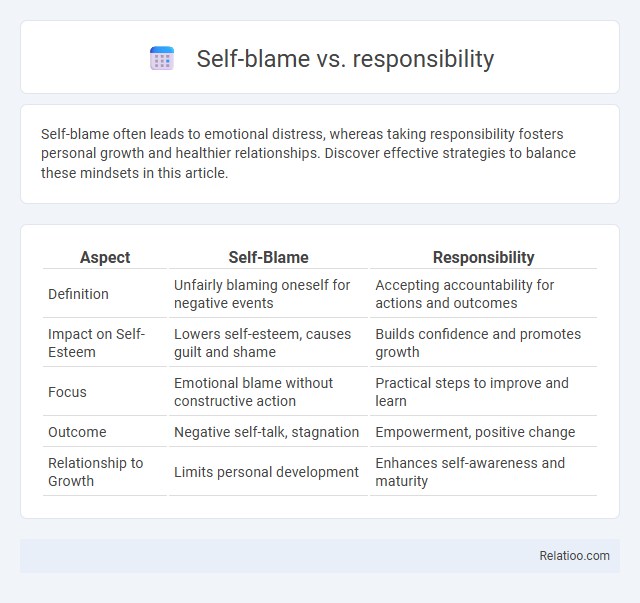Self-blame often leads to emotional distress, whereas taking responsibility fosters personal growth and healthier relationships. Discover effective strategies to balance these mindsets in this article.
Table of Comparison
| Aspect | Self-Blame | Responsibility |
|---|---|---|
| Definition | Unfairly blaming oneself for negative events | Accepting accountability for actions and outcomes |
| Impact on Self-Esteem | Lowers self-esteem, causes guilt and shame | Builds confidence and promotes growth |
| Focus | Emotional blame without constructive action | Practical steps to improve and learn |
| Outcome | Negative self-talk, stagnation | Empowerment, positive change |
| Relationship to Growth | Limits personal development | Enhances self-awareness and maturity |
Understanding Self-Blame and Responsibility
Understanding self-blame involves recognizing how your mind assigns fault for negative outcomes, often exaggerating personal mistakes beyond realistic responsibility. Responsibility refers to your ability to acknowledge and accept your role in a situation while maintaining a balanced perspective without undue guilt. Distinguishing between self-blame and responsibility empowers you to take constructive actions without being overwhelmed by irrational self-criticism.
Defining Self-Blame: Causes and Consequences
Self-blame occurs when You internalize fault for negative events, often due to cognitive biases or a need for control. It differs from responsibility, which involves acknowledging one's role accurately without emotional distortion. Persistent self-blame can lead to anxiety, depression, and decreased self-esteem, negatively impacting mental health and decision-making.
What Does Taking Responsibility Really Mean?
Taking responsibility means acknowledging one's role in a situation without internalizing undue guilt or self-blame. It involves objectively assessing actions and outcomes, learning from mistakes, and making conscious efforts to improve or rectify problems. Unlike self-blame, which fosters negativity and stagnation, responsible accountability promotes personal growth and constructive change.
Psychological Roots of Self-Blame
Self-blame often stems from internalized guilt and deep-seated cognitive distortions that link personal worth to mistakes, differentiating it from healthy responsibility, which involves accountability without harsh self-judgment. Psychological roots of self-blame include unresolved trauma, low self-esteem, and maladaptive thought patterns reinforced by past experiences, leading Your mind to unfairly assign fault to yourself. Understanding these origins helps separate self-blame from constructive responsibility, promoting emotional resilience and mental well-being.
The Benefits of Embracing Responsibility
Embracing responsibility fosters personal growth and empowerment by allowing you to acknowledge mistakes without being trapped in self-blame, which can lead to negativity and stagnation. Taking responsibility encourages solution-oriented thinking, improves decision-making skills, and strengthens emotional resilience. This mindset shift promotes accountability, enabling you to learn from experiences and build healthier relationships.
Self-Blame vs. Responsibility: Key Differences
Self-blame involves attributing fault internally for negative outcomes, often leading to decreased self-esteem and emotional distress. Responsibility refers to acknowledging one's role in a situation while maintaining a balanced perspective, enabling constructive problem-solving and personal growth. Distinguishing self-blame from responsibility is crucial, as responsibility fosters accountability without the harmful self-criticism characteristic of self-blame.
How Self-Blame Undermines Personal Growth
Self-blame erodes Your confidence and hinders emotional resilience by focusing on past mistakes instead of actionable solutions, which stalls personal growth. Responsibility empowers You to learn from errors and make informed decisions that promote self-improvement and accountability. Distinguishing self-blame from responsibility is crucial for fostering a healthy mindset that supports positive change and continuous development.
Building Healthy Responsibility Without Shame
Building healthy responsibility involves recognizing personal accountability without succumbing to self-blame or shame, which can undermine confidence and growth. Emphasizing constructive self-awareness encourages learning from mistakes while maintaining self-compassion and resilience. This balanced approach fosters emotional well-being and empowers individuals to take meaningful actions without internalizing negative judgments.
Strategies to Shift from Self-Blame to Responsibility
Shifting from self-blame to responsibility involves recognizing your role in a situation without negative self-judgment, enabling a constructive approach to growth and problem-solving. Techniques such as mindfulness, cognitive restructuring, and setting actionable goals help reframe mistakes as learning opportunities rather than sources of shame. Emphasizing self-compassion supports your ability to accept accountability while fostering resilience and positive change.
Cultivating Self-Compassion in Personal Accountability
Cultivating self-compassion in personal accountability involves distinguishing between healthy responsibility and harmful self-blame, which can lead to decreased motivation and increased emotional distress. Embracing self-compassion encourages acknowledging mistakes without harsh judgment, fostering growth-oriented reflection and resilience. This balanced approach supports mental well-being while promoting effective problem-solving and sustained personal development.

Infographic: Self-blame vs Responsibility
 relatioo.com
relatioo.com